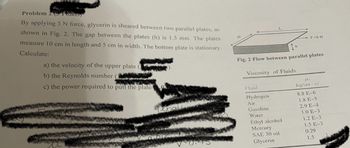
Elements Of Electromagnetics
7th Edition
ISBN: 9780190698614
Author: Sadiku, Matthew N. O.
Publisher: Oxford University Press
expand_more
expand_more
format_list_bulleted
Question

Transcribed Image Text:Problem 2 Fomts)
By applying 5 N force, glycerin is sheared between two parallel plates, as
shown in Fig. 2. The gap between the plates (h) is 1.5 mm. The plates
measure 10 cm in length and 5 cm in width. The bottom plate is stationary.
Calculate:
a) the velocity of the upper plate
b) the Reynolds number (1
c) the power required to pull the plate
0:45
Fig. 2 Flow between parallel plates
Viscosity of Fluids
Fluid
Hydrogen
Air
F =5 N
Gasoline
Water
Ethyl alcohol
Mercury
SAE 30 oil
Glycerin
P.
kg/(ms)
8.8 E-6
1.8 E-5
2.9 E-4
1.0 E-3
1.2 E-3
1.5 E-3
0.29
1.5
Expert Solution
This question has been solved!
Explore an expertly crafted, step-by-step solution for a thorough understanding of key concepts.
Step by stepSolved in 4 steps

Follow-up Questions
Read through expert solutions to related follow-up questions below.
Follow-up Question
For part b, can you clarify the values used to calculate the Reynolds number? On my screen it is appearing as:
Re = 1000×1×0.11.5= 66.67
What is the 0.11.5?
Solution
by Bartleby Expert
Follow-up Questions
Read through expert solutions to related follow-up questions below.
Follow-up Question
For part b, can you clarify the values used to calculate the Reynolds number? On my screen it is appearing as:
Re = 1000×1×0.11.5= 66.67
What is the 0.11.5?
Solution
by Bartleby Expert
Knowledge Booster
Learn more about
Need a deep-dive on the concept behind this application? Look no further. Learn more about this topic, mechanical-engineering and related others by exploring similar questions and additional content below.Similar questions
- A cylindrical machine part moves within a surrounding cylinder. The centrelines of the part and the surrounding cylinder are coincident. The cylinder is full of an oil (viscosity 0.25kg/ms) that is not flowing i.e. no pressure gradient is applied. What is the value of the viscous force exerted on the machine part as it moves along the cylinder at a speed of 9m/s? • The machine part is 0.06m long and has a radius of 0.041m. • The ratio of the machine part radius to the cylinder radius is 0.98. • Assume that the flow is dominated by viscous forces. • Give your answer as an absolute value i.e. no negative sign, in Newtons to one decimal place.arrow_forwardProblem 2 The apparatus sketched in the figure below serves as a viscometer i.e. it can be used to measure the viscosity of a liquid. In the drawing, D is a large reservoir containing a viscous liquid A and E is a cylindrical tube of radius R, open at both ends, surrounding and coaxial with B, which is a cylindrical "bob" of radius êR that is dragged up through the fluid by a frictionless pulley system (C) utilizing a weight W. Determine a design equation that relates the viscosity of the liquid to the geometry of the system and the weight W. Hint: you can assume that the length of the cylindrical tube is sufficiently long for the flow to reach steady state. W E D Barrow_forwardOil Coating: A long, continuous belt is pulled upwards through a chemical oil bath at velocity V0. The belt has rectangular cross-section and has length (L), width into the paper (W). The belt picks up a film of oil of thickness h, density ρ, and dynamic viscosity μ. Gravity g tends to make the oil drain down, but the movement of the belt keeps the fluid from running off completely. Assume fully developed, steady, laminar, incompressible and two-dimensional flow of oil to answer the following questions. Assume that no pressure gradient is needed in the vertical direction to drive the film flow. Also assume that the shear stress at the air-oil interface is zero (free shear condition). Assume no-slip condition for the fluid in contact with the moving belt. Justify any other assumptions you may make. Show all steps. (a) Derive an expression for the two-dimensional velocity field inside the oil film in terms of the known parameters. Clearly indicate your co-ordinates and origin. You must…arrow_forward
Recommended textbooks for you
 Elements Of ElectromagneticsMechanical EngineeringISBN:9780190698614Author:Sadiku, Matthew N. O.Publisher:Oxford University Press
Elements Of ElectromagneticsMechanical EngineeringISBN:9780190698614Author:Sadiku, Matthew N. O.Publisher:Oxford University Press Mechanics of Materials (10th Edition)Mechanical EngineeringISBN:9780134319650Author:Russell C. HibbelerPublisher:PEARSON
Mechanics of Materials (10th Edition)Mechanical EngineeringISBN:9780134319650Author:Russell C. HibbelerPublisher:PEARSON Thermodynamics: An Engineering ApproachMechanical EngineeringISBN:9781259822674Author:Yunus A. Cengel Dr., Michael A. BolesPublisher:McGraw-Hill Education
Thermodynamics: An Engineering ApproachMechanical EngineeringISBN:9781259822674Author:Yunus A. Cengel Dr., Michael A. BolesPublisher:McGraw-Hill Education Control Systems EngineeringMechanical EngineeringISBN:9781118170519Author:Norman S. NisePublisher:WILEY
Control Systems EngineeringMechanical EngineeringISBN:9781118170519Author:Norman S. NisePublisher:WILEY Mechanics of Materials (MindTap Course List)Mechanical EngineeringISBN:9781337093347Author:Barry J. Goodno, James M. GerePublisher:Cengage Learning
Mechanics of Materials (MindTap Course List)Mechanical EngineeringISBN:9781337093347Author:Barry J. Goodno, James M. GerePublisher:Cengage Learning Engineering Mechanics: StaticsMechanical EngineeringISBN:9781118807330Author:James L. Meriam, L. G. Kraige, J. N. BoltonPublisher:WILEY
Engineering Mechanics: StaticsMechanical EngineeringISBN:9781118807330Author:James L. Meriam, L. G. Kraige, J. N. BoltonPublisher:WILEY

Elements Of Electromagnetics
Mechanical Engineering
ISBN:9780190698614
Author:Sadiku, Matthew N. O.
Publisher:Oxford University Press

Mechanics of Materials (10th Edition)
Mechanical Engineering
ISBN:9780134319650
Author:Russell C. Hibbeler
Publisher:PEARSON

Thermodynamics: An Engineering Approach
Mechanical Engineering
ISBN:9781259822674
Author:Yunus A. Cengel Dr., Michael A. Boles
Publisher:McGraw-Hill Education

Control Systems Engineering
Mechanical Engineering
ISBN:9781118170519
Author:Norman S. Nise
Publisher:WILEY

Mechanics of Materials (MindTap Course List)
Mechanical Engineering
ISBN:9781337093347
Author:Barry J. Goodno, James M. Gere
Publisher:Cengage Learning

Engineering Mechanics: Statics
Mechanical Engineering
ISBN:9781118807330
Author:James L. Meriam, L. G. Kraige, J. N. Bolton
Publisher:WILEY